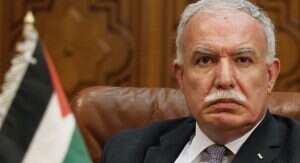Palestinian Authority President Mahmoud Abbas on Monday again called for an international conference early next year to discuss the conflict with Israel, saying that a summit was the only way to generate momentum to bring Israelis and Palestinians to negotiate a peace agreement.
Backing the statement, Palestinian Foreign Minister Riyad al-Malki told the UN Security Council: "Anything else is volatile, and it is futile." The US Ambassador to the UN Kelly Craft said that the Trump administration has "no objection" to meeting international partners on the Israel-PA conflict.
Follow Israel Hayom on Facebook and Twitter
Abbas called for a conference in his virtual address to the UN General Assembly's annual meeting of world leaders in late September to launch "a genuine peace process." He called on UN Secretary-General Antonio Guterres to undertake preparations along with the so-called Quartet of Mideast mediators – the US, UN, European Union and Russia.
Ambassador Craft was skeptical that a conference would produce results but said the Trump administration, Israel's closest and most important ally, was open to the possibility raised by Abbas.

"We have no objection to meeting with international partners to discuss the issue. But I have to ask, how is this different than every other meeting convened on this issue over the past 60 years?" she asked the council.
Israel's new UN Ambassador Gilad Erdan opposed the Palestinian call, accusing Abbas of refusing "every peace offer made by the state of Israel" and attacking Israel's recent agreements with the United Arab Emirates, Bahrain and Sudan instead of viewing them as "a new opportunity to kick-start negotiations."
There have been no substantive peace talks between Israel and the Palestinians for about a decade. Prime Minister Benjamin Netanyahu has repeatedly stated that he was willing to resume negotiations without preconditions, but the PA has opted for a policy of rejectionism. Abbas has even severed ties with the US following the introduction of the US peace plan in January and has condemned the recent peace deals between Arab nations and the Jewish state as a "betrayal" of the Palestinian cause.
Craft encouraged Mideast countries and Security Council members to support Israeli-Palestinian negotiations based on the Trump peace plan – and "to embrace the opportunities" presented by the accords with the UAE, Bahrain, and Sudan.
Malki said it was "ridiculous" to claim the Palestinians wouldn't negotiate, pointing among other things to the identification of final status issues by both sides which were to be negotiated based on internationally agreed terms of reference and parameters by 1999.
"Here is Netanyahu's stance on these issues: Jerusalem, including occupied East Jerusalem, shall be Israeli," Malki said. "Illegal settlements shall remain in place. Refugees shall remain refugees. Israel shall continue to control our borders. Israel shall control all of the Jordan Valley and with it most of our natural resources."
He said these positions "are contemptuous and unlawful" and show Israel wants to make its occupation permanent.
Israel's Erdan countered that Netanyahu has invited Abbas to Jerusalem many times and has even offered to go to the Palestinian Authority's headquarters in the West Bank town of Ramallah.
"But Abbas wastes time calling for another useless conference," Erdan said. "Instead, this council should call on the Palestinians to begin negotiations based on the American vision for peace, which is a good starting point for realistic, sustainable peace."
Subscribe to Israel Hayom's daily newsletter and never miss our top stories!




